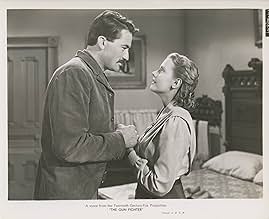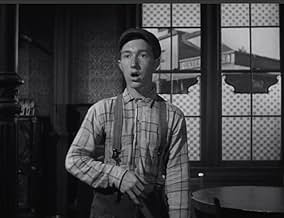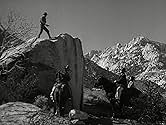CALIFICACIÓN DE IMDb
7.7/10
14 k
TU CALIFICACIÓN
El famoso pistolero Jimmy Ringo cabalga a la ciudad para encontrar a su verdadero amor, que no quiere verlo. No busca problemas, pero se los encuentra a cada paso.El famoso pistolero Jimmy Ringo cabalga a la ciudad para encontrar a su verdadero amor, que no quiere verlo. No busca problemas, pero se los encuentra a cada paso.El famoso pistolero Jimmy Ringo cabalga a la ciudad para encontrar a su verdadero amor, que no quiere verlo. No busca problemas, pero se los encuentra a cada paso.
- Dirección
- Guionistas
- Elenco
- Nominado a 1 premio Óscar
- 2 premios ganados y 2 nominaciones en total
Victor Adamson
- Townsman at Funeral
- (sin créditos)
Murray Alper
- Townsman at Funeral
- (sin créditos)
C.E. Anderson
- Street Loafer
- (sin créditos)
Carl Andre
- Street Loafer
- (sin créditos)
Beulah Archuletta
- Indian Woman
- (sin créditos)
Gregg Barton
- Pete's Pal
- (sin créditos)
Arthur Berkeley
- Townsman at Funeral
- (sin créditos)
Chet Brandenburg
- Townsman at Funeral
- (sin créditos)
Opiniones destacadas
The Gunfighter established the trend for mature Hollywood westerns by having the hero be a mature gunfighter who wants to retire in peace, not in pieces. The movie created the line which has been parodied since "everywhere I go, some young punk wants to try me." Using Richard Jaeckle and Skip Homier as the young wanna-be gunfighters was a classic piece of casting, since both of them went on to play similar parts in westerns, although not together. One piece of trivia about this film was that Harry Cohn at Columbia originally had bought the script with the intent of having John Wayne play the lead. Wayne,by now, was a major star, producing his own films. Wayne wanted to do the role, but didn't want to do it at Columbia. As a young actor, he had been treated badly by Cohn who humiliated him after his disastrous first lead in "The Big Trail." Wayne told Cohn in so many words what he could do with his script. The script was then sold to Twentieth Century Fox. Wayne did play a similar role in his final picture, "The Shootist."
I chanced upon the DVD of this movie at the local library and decided to check it out, as having already previously watched Peck in other Westerns like "The Bravados", "The Big Country" & "Mackenna's Gold". In all these films, he appears to me to be playing the same kind of role - a reserved character whose behavior is atypical to those around him which manages to garner him unwelcome attention. Here in "The Gunfighter", he plays Jimmie Ringo - a tribute to the Johnny Ringo character, perhaps? - a dead-hand gunslinger with 15 kills to his credit (or discredit, whichever way you look at it), who wishes to put the past behind him and to be left alone and start a life anew in peaceful obscurity, but is hounded everywhere by would-be wannabe Billy the Kids who are vying for the "honor" and "distinction" of having shot him. Reminds me of the movie "The Shootist" starring John Wayne, which has basically an identical plot. Technically speaking, Ringo is an outlaw to be feared by the general public, yet one can't help but take sides with him and empathize with his situation. Serendipity takes him to a town where the Marshal turns out to be his ex-compatriot in crime and the bartender knows him from elsewhere but feels nothing but admiration for his past exploits and both do everything they can to help him, much to the dismay and annoyance of the townspeople especially the Ladies Committee made up of self-righteous biddies.
I understand that this movie did not do too well at the box office but great films are not necessarily big money-earners, and vice-versa. This is one Western which is, like the roles Gregory Peck plays in films of such genre, is atypical in that the emphasis is more on the study of central character and his inner self rather than his deeds. The only flaw I found was the lack of a proper movie score especially for some of the more tense scenes like the confrontation with the 3 cowboys, which would have highlighted the moments. Otherwise, a great film in my opinion.
I understand that this movie did not do too well at the box office but great films are not necessarily big money-earners, and vice-versa. This is one Western which is, like the roles Gregory Peck plays in films of such genre, is atypical in that the emphasis is more on the study of central character and his inner self rather than his deeds. The only flaw I found was the lack of a proper movie score especially for some of the more tense scenes like the confrontation with the 3 cowboys, which would have highlighted the moments. Otherwise, a great film in my opinion.
No need to recap what's essentially a well done, but one-note plot. It looks like the seeds of a hundred TV westerns get their start here as Peck's weary gunfighter shows the many ravages of being Top Gun. Then too, the clock watching plus the vengeful riders coming to town looks a lot like the later High Noon (1952). I suspect this was one of the more influential oaters of the period.
It's also shrewdly cast. Peck's rather stiff acting style works well for the besieged Ringo, a man now living mainly within himself since nobody can be trusted. But I especially like Mitchell's sheriff. He projects real authority tinged by an appropriate hint of understanding. Plus, he looks like a genuine frontier hard guy. Too bad this unusual actor died so soon. And was there ever a better dislikable young punk than Skip Homeier, who made a brief career out of such unlovelies. On the other hand, Westcott appears a shade too young (22) to be Ringo's wife and mother of an eight-year old, but at least she's not glamorous in the usual Hollywood style.
The climax is appropriately non-heroic, just a couple shots in an alleyway. Not exactly the usual Hollywood showdown. I suspect that's one reason for the rather mythic final sequence, for Peck has managed to inject a touch of nobility into the character of the ravaged gunfighter. All in all, it's a somber and elegiac eighty-minutes that eventually cast quite a forward shadow.
It's also shrewdly cast. Peck's rather stiff acting style works well for the besieged Ringo, a man now living mainly within himself since nobody can be trusted. But I especially like Mitchell's sheriff. He projects real authority tinged by an appropriate hint of understanding. Plus, he looks like a genuine frontier hard guy. Too bad this unusual actor died so soon. And was there ever a better dislikable young punk than Skip Homeier, who made a brief career out of such unlovelies. On the other hand, Westcott appears a shade too young (22) to be Ringo's wife and mother of an eight-year old, but at least she's not glamorous in the usual Hollywood style.
The climax is appropriately non-heroic, just a couple shots in an alleyway. Not exactly the usual Hollywood showdown. I suspect that's one reason for the rather mythic final sequence, for Peck has managed to inject a touch of nobility into the character of the ravaged gunfighter. All in all, it's a somber and elegiac eighty-minutes that eventually cast quite a forward shadow.
I found every moment of this movie gripping. Now, I am a fan of the Western genre, but this one is one of my favorites along with The Oxbow Incident and Butch Cassidy and the Sundance Kid. The "tough-guy who can not get away from his past/reputation" is a classic and Gregory Peck's performance has the perfect air of menace and weariness for the role. I recommend this movie to anyone who enjoys thoughtful and dramatic movies.
Meet the western, deglamorized: gunslinging makes you feel guilty, your ex is a prudish school teacher too hung up on your trail of corpses to see you, the town where you've decamped is filled with half-witted bums, puritans, celebrity-gazers and a most unlikely marshal, and somewhere on your trail are three brothers of the dead smart ass who drew on you in the last town. Jesus, do you need a whiskey.
No ordinary genre film, "The Gunfighter" (1950) is both a hugely satisfying entertainment and a conventional studio film with surprising depths. The surprise comes from the nature of the western in the mid-century where, with few exceptions, the black-and-white morality plays are as plain as the gunfire. Not so here, where we get the treat of seeing Gregory Peck play an antihero who has stepped far outside of conventional morality and now wants readmission, even though the bloodstains won't wash out. Welcome to Ambiguiety Gulch.
It's tempting to say that "Gunfighter" looks forward to the spaghetti western, especially in its themes of alienation and social revulsion. Frankly, though, it feels less like a western and more like a film noir. The feeling of claustrophobia is always near, whether in Peck's fear of another violent summons or in subplots involving the closeted desires of various townspeople to kill him (one gritty sequence in a boarding room is more unsettling than anything in Hawks or Ford). Surfaces are untrustworthy, motivations questionable, psychological derangement hovers in the wings, the "law" is both more and less than it appears, and as characters make startling pacts with their bloody pasts you can almost sense the triumphalism of the post-war years turning to anxiety and dread.
No ordinary genre film, "The Gunfighter" (1950) is both a hugely satisfying entertainment and a conventional studio film with surprising depths. The surprise comes from the nature of the western in the mid-century where, with few exceptions, the black-and-white morality plays are as plain as the gunfire. Not so here, where we get the treat of seeing Gregory Peck play an antihero who has stepped far outside of conventional morality and now wants readmission, even though the bloodstains won't wash out. Welcome to Ambiguiety Gulch.
It's tempting to say that "Gunfighter" looks forward to the spaghetti western, especially in its themes of alienation and social revulsion. Frankly, though, it feels less like a western and more like a film noir. The feeling of claustrophobia is always near, whether in Peck's fear of another violent summons or in subplots involving the closeted desires of various townspeople to kill him (one gritty sequence in a boarding room is more unsettling than anything in Hawks or Ford). Surfaces are untrustworthy, motivations questionable, psychological derangement hovers in the wings, the "law" is both more and less than it appears, and as characters make startling pacts with their bloody pasts you can almost sense the triumphalism of the post-war years turning to anxiety and dread.
¿Sabías que…?
- TriviaThe studio hated Gregory Peck's authentic period mustache. In fact, the head of production at Fox, Spyros P. Skouras, was out of town when production began. By the time he got back, so much of the film had been shot that it was too late to order Peck to shave it off and reshoot. After the film did not do well at the box office, Skouras ran into Peck and reportedly said, "That mustache cost us millions."
- ErroresWhen Marshal Strett first confronts Ringo, he brings three deputies with him. Later, when Deputy Charlie comes to sit shotgun, Ringo doesn't recognize him and asks the bartender, "Who is he?"
It was established that Ringo doesn't remember people from his failure to recognize the bartenders. It's easy to forget someone you've seen for only a couple minutes and weren't introduced to.
- Citas
Marshal Mark Strett: Somebody after you?
Jimmy Ringo: Three somebodies.
Marshal Mark Strett: The law?
Jimmy Ringo: Naw, this is personal.
Marshal Mark Strett: I don't want 'em to catch up with you here.
Jimmy Ringo: I don't want 'em to catch up with me anywhere.
- ConexionesFeatured in America at the Movies (1976)
Selecciones populares
Inicia sesión para calificar y agrega a la lista de videos para obtener recomendaciones personalizadas
- How long is The Gunfighter?Con tecnología de Alexa
Detalles
- Tiempo de ejecución
- 1h 25min(85 min)
- Color
- Relación de aspecto
- 1.33 : 1
Contribuir a esta página
Sugiere una edición o agrega el contenido que falta







































